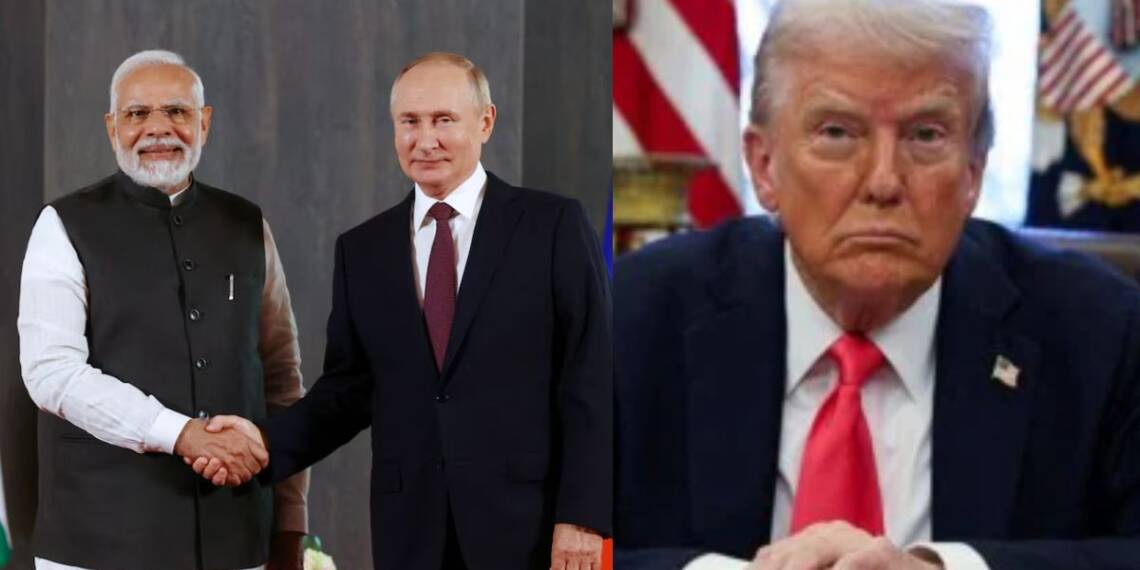For the past few days US President Donald Trump has publicly displayed his displeasure against the strong Russia India ties. To cut them off he has resorted to his tariff tactics pushing for sanctions against India to setback the relations and pull India away from the BRICS lobby.
However the Indian response has been the complete opposite, first India took a stance against the tariffs, then admonished the West for its hypocritical standards.
However now New Delhi seems to be taking a step further, in a big diplomatic move that may reshape global dynamics, India’s National Security Adviser (NSA), Ajit Doval has landed in Moscow this week for high-level meetings aimed at fast-tracking defence procurements and energy cooperation with Russia. The visit underscores India’s continued intent to deepen ties with a key partner a move viewed by many as a complete deviation from Western influence.
Why Is India’s NSA in Russia?
NSA Ajit Doval’s visit comes at a crucial time, as both India and Russia seek to strengthen bilateral cooperation in defence, energy, and emerging technologies. Official sources confirm that Doval is in Moscow to engage in closed-door talks with top Russian security, intelligence, and political officials to:
Expedite stalled or delayed defence contracts, including joint production of weapon systems and critical spare parts supply
Secure long-term crude oil and gas deals amid ongoing volatility in global energy markets.
Discuss strategic cooperation in cybersecurity, artificial intelligence, and quantum technology.
Coordinate positions ahead of the upcoming BRICS summit in Kazan, where both nations are expected to unveil initiatives to reduce dependency on the West.
Additionally, Doval’s visit comes amid growing concerns in India’s defence establishment about supply chain vulnerabilities and the need to ensure timely maintenance of Russian-origin equipment, which still constitutes over 60% of India’s military hardware.
His presence in Moscow reflects the seriousness with which New Delhi views these discussions, especially the historic Russia India partnership.
Defence and Oil Deals
Doval’s trip aims to fast-track long-discussed military collaborations that have faced delays due to Western sanctions on Russia. High on the agenda are:
The Indo-Russian AK-203 assault rifle joint production line.
Additional S-400 missile system deliveries.
Maintenance support for India’s Sukhoi and MiG fighter jets.
Joint development of next-generation technologies in aerospace and cyber defence.
Russia, keen to retain India as a major defence partner, is reportedly offering deeper technology transfer and co-development options, in line with India’s ‘Make in India’ initiative.
India, the world’s third-largest energy consumer, is seeking long-term discounted deals with Russia to hedge against global price shocks. Since 2022, India has ramped up its import of Russian crude, paying in rupees, yuan, and UAE dirhams to bypass Western financial channels.
Doval is expected to finalize framework agreements to ensure uninterrupted supply, expand Indian investments in Russia’s Far East, and enhance energy cooperation in LNG and nuclear sectors.
Trump’s Tariff threats dismissed?
Meanwhile India’s Foreign Ministry rebuffed U.S. tariff threats over its oil imports, calling them “unjustified and unreasonable.” Officials emphasized that India’s purchases of 1.75 million barrels per day of Russian crude are essential to national needs.
India believes it is hypocritical for the U.S. and EU to criticize India while continuing trade with Russia in LNG, uranium, and other resources. India has stated that it will not bow to external economic pressures.
Moscow has offered strong diplomatic backing to India’s actions. Russian officials branded Trump’s tariff threats as “illegitimate,” reaffirming that sovereign nations should choose their trade partners freely.
The Russian Embassy described India as one of Moscow’s “main like‑minded partners” and praised the trust‑based bilateral security dialogue. “New Delhi…whose friendship has confidently stood the test of time.”
India’s assertive engagement with Russia is widely seen as a diplomatic setback for the West — particularly the U.S. and NATO — which have aimed to diplomatically and economically isolate Moscow.
In essence, India’s stance is both strategic and symbolic: a reminder to Washington that India has its own sovereign policies and will continue to pursue them.
Doval’s high-profile visit to Moscow reflects a decisive shift in India’s global engagement strategy. With Trump-era protectionism possibly returning, Western alliance’s showing cracks, New Delhi is positioning itself for autonomy.
This also signals the huge power rise of the BRICS bloc and the weakening of NATO as the India Russia and China troika continue to chart a path away from the western bloc and into a new multi polar world.







